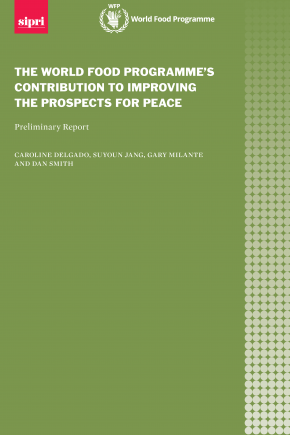The World Food Programme’s Contribution to Improving the Prospects for Peace
Established in 2018, the knowledge partnership between SIPRI and the World Food Programme (WFP) aims is to assess whether WFP’s programming contributes to improving the prospects for peace, and if so, explaining how—while at the same time asking whether the programming has any unwanted negative effects. This report is the first publication of this partnership.
The report is based on four field research-based case studies in El Salvador, Iraq, Kyrgyzstan and Mali, which looked at WFP programming in diverse situations, including outright violent conflict and transition from violence to sustainable peace. The case studies showed that significant components of WFP’s work in these four countries do indeed contribute to improving the prospects for peace. The strongest contributions were found in livelihood investments, in building good links between the state and citizens, in natural resource management and in community-based participatory approaches. The research also explored whether WFP’s programming had an identifiable effect in exacerbating conflict or increasing the risk of conflict. The results are mixed, and there are some instances of WFP programming having a marginal negative effect or risking one.
The research suggests that WFP will need to make changes if it is to fulfil its stated ambitions and commitments under the 2016 United Nations Peace Promise and other policy statements. These changes may be only partly about changing what WFP does, focusing more on how it does its work. The report proposes five areas of change, including conflict sensitivity, targeting aid, working holistically, partnerships management and the challenge of measuring progress in contributing to peace.
1. Introduction
2. WFP’s contribution to improving the prospects for peace
3. Cross-cutting findings
4. Enhancing WFP’s contributions to improving the prospects for peace
5. Summary of recommendations




